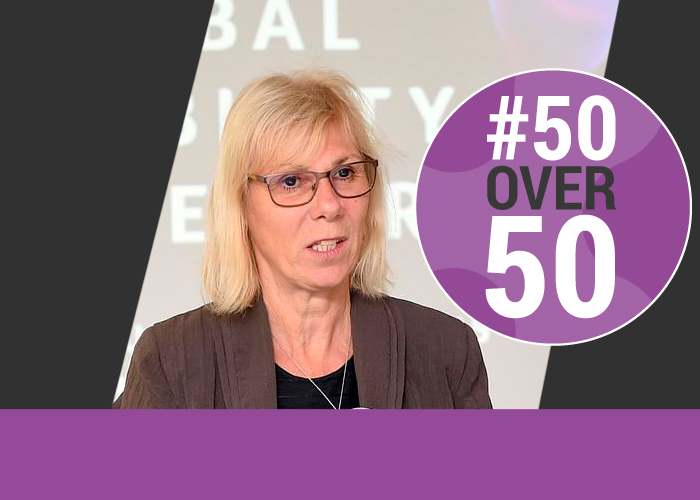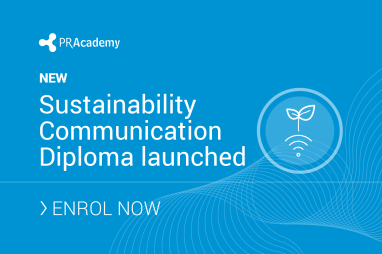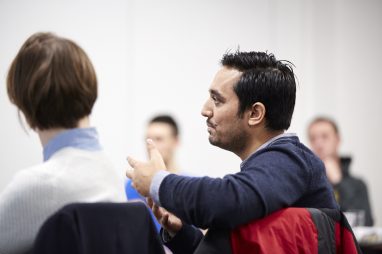#50over50: Anne Gregory

About the author
Richard Bailey Hon FCIPR is editor of PR Academy's PR Place Insights. He teaches and assesses undergraduate, postgraduate and professional students.

‘Muck and bullets’: a dispatch from the educational front line
Of all the people we’ve featured in this series, Professor Anne Gregory may be the least in need of an introduction. She’s well known as an author, academic and as the past president who gained the CIPR its royal charter. So this profile felt appropriate in the CIPR’s 75th anniversary year.
That’s where we started our conversation. Reflecting on chartered status, granted in 2005, she describes it as happening at ‘the right moment. There was a real yearning for the industry to professionalise and to be recognised for the work that it did.
‘Yet the royal charter never was a destination, it was always a step on a journey. We have about 650 Chartered Practitioners, which is great, so there are signs of progress.
‘But in other ways we are, to quote Jon White, like a car stuck in the mud with spinning wheels. We go round and round the same arguments. How do we get recognition as a profession unless we agree on our name? I almost don’t care what our label is, but if we can’t describe what we do in a couple of sentences – because a financial director can – and agree on what we call our profession, then we’ll always be on shaky ground in the eyes of many people.
‘A lot of our professional colleagues don’t recognise the phrase public relations; the public sector is hugely important and for them communication is preferable to public relations. I happen to believe that public relations is the best description because it is what we actually do: we work with publics, our work is in public and it’s about building relationships. But the name itself does not have the cachet we would like it to have, often because of its pejorative connotations.
’We also need to take care about how we talk about our work if we are to continue on the journey to more professional recognition. What we do is highly skilled and important, but we don’t help ourselves.
How many times have you heard a public relations person say ‘it’s not rocket science’? How true, it isn’t; it’s much harder. There are manuals for building rockets. You can’t do this job just with a manual.
Turning to public relations education, how to explain the gap between the growth in scholarly outputs against the decline in undergraduate public relations degrees?
‘I think it’s a huge shame that the single honours is disappearing because there are careers to be had – the employability statistics are amazing. But there are other things going on here. It’s not just about public relations losing its place. It’s about the commercialisation of higher education and ensuring that universities remain solvent. Their challenge is to make undergraduate courses sustainable when student fees have not increased for several years, yet university costs have gone up. Not that I’m advocating student fees, I’m not.
‘Combinations of degrees lead to greater efficiencies. It’s more efficient to teach 200 students sharing a number of joint modules than 30 students doing their own specialist degrees – and they still get jobs. Also, some students like to do combination degrees because it gives them more options and the reality is that the communicative disciplines are merging. So you can see why marketing, public relations and journalism could be put together. But they are very different. I can’t see moves to merge economics and accounting!’
‘There’s also pressure from some employers. Although recent research does show many do want specialist public relations graduates there are others who want a whole range of things not necessarily satisfied by one degree.
‘Controversially, perhaps we should consider not having undergraduate degrees in public relations for 18 year olds. Maybe you need to be 25 to study public relations, just as for an MBA you usually need two years work experience, because it’s only by having a level of worldly wisdom and some scars on your back that you can get the most out of it!’
She discussed what motivates her as an educator.
‘I’ve always had a paranoia as an academic of being ‘out of touch’. I come from practice and ironically I moved out of it to try to make it better. I wanted time to think and help provide some solid underpinning so it could be recognised as a profession. Academic publications are a requirement because they count towards university rankings. I write theoretical articles for high ranking journals that may only be read by a couple of people because it’s part of the job. But my happy place is in the ‘muck and bullets’. That’s why I love writing practical things too like the book Planning and Managing Public Relations Campaigns and the CIPR’s Ethics Guide to Artificial Intelligence in PR.
‘I also like being challenged by students. When no one else wanted to I chose to teach students on an HND/BTech course because they were often from backgrounds like mine, from a council estate. All you needed to do was to give them opportunity and ignite a spark in them; then they shone like everybody else. Any number of them then went on to complete the degree. It is a huge privilege to be with those young people, to be a part of their lives. People at 18 years old have minds that are so plastic: they’re challenging, but they’re growing at such a rate intellectually and as people. They teach you so much: they’re a joy to be with.
‘I now work almost exclusively with senior people in executive education and again it’s the challenge. The real world challenge of how do we do our jobs better; become better leaders; be respected by senior managers; operate and advise in the boardroom? That’s my world now – but it’s still ‘muck and bullets.’
‘The reason that I write the practical stuff? My PhD was on contemporary issues in public relations, so I write about evaluation, I write about leadership, right now I’m writing about artificial intelligence. My passion is: what are the challenges facing the profession now and can I contribute to their resolution by working with those at the sharp end?
‘Practitioners provide my inspiration. I don’t sit in an ivory tower with a hot towel on my head, dreaming up things. The people that I work with everyday, whether they’re 18 year olds or senior executives, or colleagues in the CIPR, they are my inspiration to think about things. I want to make a difference with them. So I’ve got to be engaged in the topics that they’re interested in.
‘I want and I believe in our practice to make the world a better place. Idealistic, I accept, but worth the effort. At the end of the day, everything comes down to communication. It’s the very essence of what it means to be human and it’s the fabric that weaves human community. If my contribution is to write in an accessible way on things that matter, then I’m in my happy place; in the muck and bullets.’


